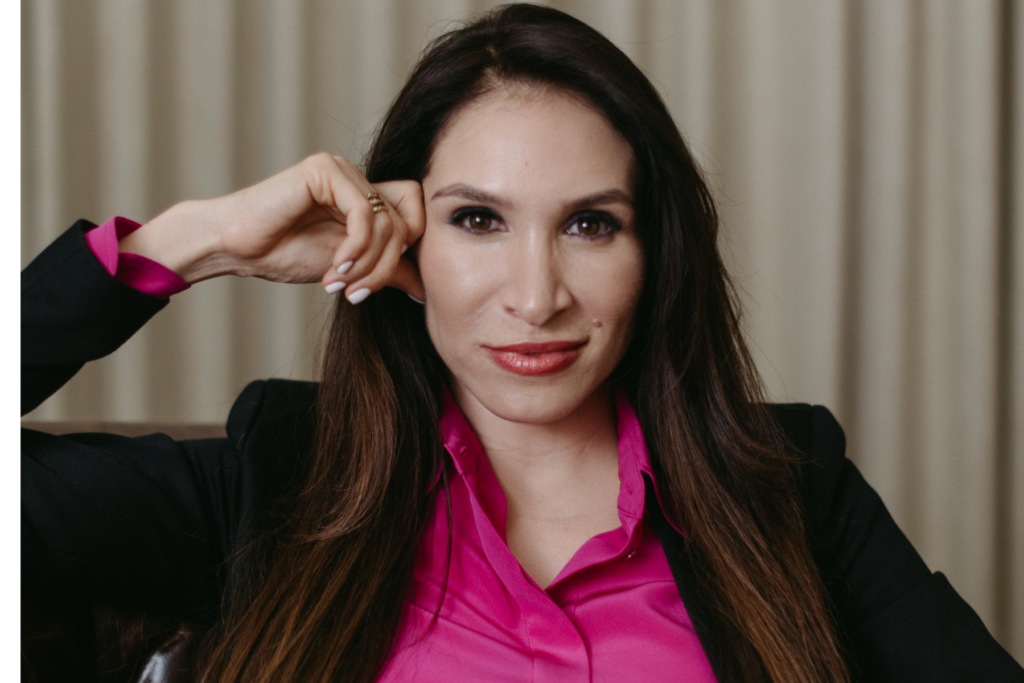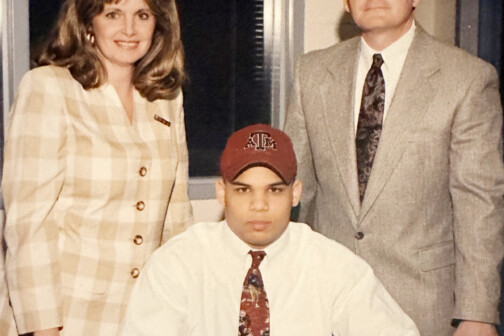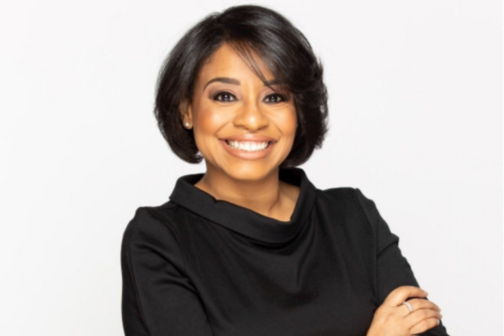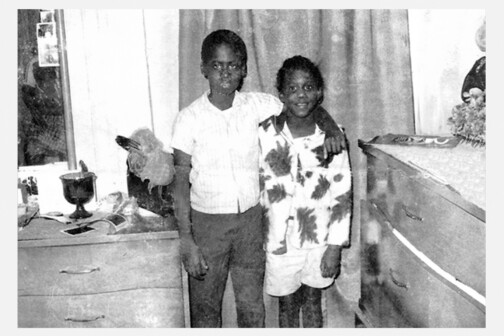Sarah Zubiate launched her Zubi’s in 2017, after a career in finance that culminated with a position as director of financial development for YMCA of Metropolitan Dallas. She grew up in the El Paso area and learned that she was adopted as a teen.
Today, she pays homage to her parents, Gloria and George Zubiate, through her company’s name and the recipes of some of her salsas and dips.
Zubiate recently talked with D CEO about making sense of her identity as a young adopted Latina, how it taught her to see differences as a strength, and her passion for supporting others.
Life on the Border
“I am originally from El Paso, Texas and Juarez, Mexico. Growing up there was a beautiful experience. I loved it. It was very different than it is now, with open borders that essentially created one city. I spent a lot of time in Juarez and went to school in El Paso. I was very close to my mom’s large family—a family of 12. We were constantly surrounded by loved ones and good food. Growing up, we didn’t have a lot by any stretch of the imagination, but it was still a beautiful life in my mind.
“I was raised in the Lower Valley, which is not the nicest part of town. I loved going on long walks by the cotton fields near our home with the desert and with mountains surrounding us. I connected with the earth through the smells of the land and the colors of the sky.
“When you cross into Juarez, you have people pedaling, little fruit stands, food stands, and crowded streets, the buildings are brighter in color, and there are beautiful murals. Although there are differences between Juarez and El Paso, the people felt the same to me because they were my friends and family.
“It wasn’t until high school that I started understanding the differences in safety between the cities—namely the danger of occurrences in Juarez. It seemed like the comfort I was raised with disappeared overnight. It was devastating. The cartel destroyed gorgeous places in Juarez, and women were slaughtered and went missing.
“So much of my life exists in duality. I was given up for adoption at birth because my birth mom couldn’t afford to keep me. I am one of four kids—third in line—and the only one given up for adoption. My parents, Gloria and George Zubiate, raised me as an only child and adopted me when they were 44.
“My mother, Gloria, was mistreated by religious authorities for not speaking proper English and speaking Spanish. Although I speak Spanish, to not have the same thing happen to me, I was constantly told by my mother to only speak Spanish in the house and only speak English when outside.
“Unfortunately, I had to learn how to defend myself in Juarez. It was different there. I was always teased by my friends who only lived in Mexico and would come to El Paso for school. They would always call me güera (white girl) because I was more Americanized.
“Later, as a teen, I was jumped by six women in Juarez because I didn’t look like them. Because I was güera. I didn’t project enough of a strong Latina, and the roots didn’t seem to be there. They pushed me and hit me while teasing me for being too white.
For whatever reason, I have processed hate as more of a ‘They have issues’ thing. It has never made me feel demoralized. I have my faith, and I am rich in family. At this point, I’m grateful for having to learn how to defend myself. But I hope my kids don’t ever experience such difficulties.”
‘Why Am I So Different?’
“Growing up, I would always ask my parents. ‘Why am I so different? I make decisions quickly. I am very opinionated. I feel so different.’ Then, finally, I realized there was some logical substance to it. There was complex thinking I had ingrained in me genetically that I quickly recognized was absent from my immediate family.
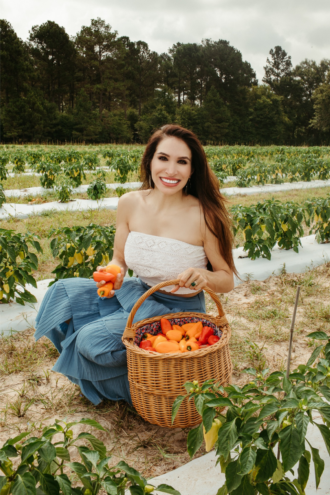
“At 17, I came to find out that I was adopted because of an argument I had with my father. I was at my aunt’s house, crying out of the frustration of being different, and she finally came clean and told me, ‘Mija, your birth mom is not Gloria.’
An understanding came over me because I thought, ‘Well, that makes sense.’ She told me, ‘Your birth mom worked as a maid for me. She was my housekeeper right until the day that she gave birth to you.’
“When I met my birth family at the age of 20, it all made sense. My siblings and I had a lot of similar genetic predispositions. I learned that my birth family was raised in the ghetto, in poverty, and had the toughest life. I saw myself in my birth mom. We look so similar, and she is a tough lady who has guts and is a risk-taker. She worked as a bus driver and started a barbershop. But before that, she worked at 7-Eleven and was once held at gunpoint. She fought off the gunman and chased him down. Suddenly, so much of who I am, and who I always knew I was, made sense.
“I look back and am thankful my mom taught me about peace, the ability to be introspective, and holding multiple opinions. My mom Gloria is a woman of peace; she’s calm and a methodical thinker.
“Today, I am very close with my biological family. We speak often and take family vacations together. My mother, Gloria, has always been so happy about me reconnecting with my biological family and has always told me how she is so glad I now have siblings. I now have a family who understands me on a different level. I came to learn that my biological family had always known about me and always celebrated my birthday every year. That is something so special for me to now know.”
Understanding Sacrifice
“The biggest lesson my adoption story has taught me is understanding. People ask me if being the only child given up for adoption ever bothered me. It has never bothered me, and I don’t quite understand why.
“I see the sacrifice my birth mom made to give me up for adoption as the part of my personal story that has influenced my success. She wanted a better life for me than what she could offer at the time. My adopted parents being American citizens, and who they are, set me up for a better life.
“I understand my mom had to give me up because she couldn’t afford to feed another child. She was already sending money back to Juarez to feed my siblings.
“I approach the situation with love, understanding, and balance—some things I think are most needed in today’s times. When I am faced with difficulties, challenges, and frustrations, and God knows they are like bullets sometimes, I always remind myself, ‘You got this.’
“I come from someone who is incredibly strong, and I have been given so much by that one decision to put me up for adoption. That decision is the start of who I am today, and it helps me feel very strong and capable.”
“I ended my finance career the day my twins were born and started selling my products at the farmer’s market. My red salsa is based on mom’s (Gloria’s) original recipe.
“I went into finance after business school and loved it, but I wanted to follow my passions in food or music. I have always thought food and music bring people together. So, being able to cook, create, and bring people happiness and unity with food always seemed like what my next step would be.”
Meeting People Where They Are
“I am sometimes treated differently when people who traditionally have a lot from birth find out about my upbringing. For example, when they learn that I am a self-made woman from humble beginnings and not abundance, they say something along the lines of ‘Oh, we thought you came from a very different upbringing’ and continue addressing me differently.
“I have always been passionate about helping people who do not come from a lot because I know crawling your way out is hard. Not everybody has a tough personality and will stand up for themselves, fight, and be vocal when faced with injustice. For me, it’s now giving back a lot to those communities.
“I take the approach of wanting to make people feel comfortable. I meet them where they are. If I can speak Spanish to them, I do. If I can engage differently, I do. I’m a person who finds commonalities amongst different people and upbringings. Instead of feeling like my differences were a negative, it’s always empowered me to know that I can quickly meet a person and help them feel more comfortable.
“I think I’ve been successful in my life because I love to connect and can relate to many people, from the super, super poor to the ultra-wealthy. I wish that people felt more empowered to see differences as a strength.
“The last few years have been eye-opening for so many. With people vocalizing a lot of their pains, struggles, and life hurdles, and having access to do so on social media, I believe that sheds light with transparency, drastically changing the intolerance for racism and the promotion of diversity.
“I hope everyone tries to challenge themselves by hearing the people they disagree with most and do not understand in the slightest, and finds good in them. I hope people step away from divisiveness and ask, ‘How can I put myself in their shoes and try and listen to those words, even though they might be painful? How can I learn from it and lead with grace, understanding, balance, and acceptance?’ I believe that Dallas has been at the forefront of that movement.”
This updated Q&A has been edited for clarity and length.
Get the D CEO Newsletter
Author



